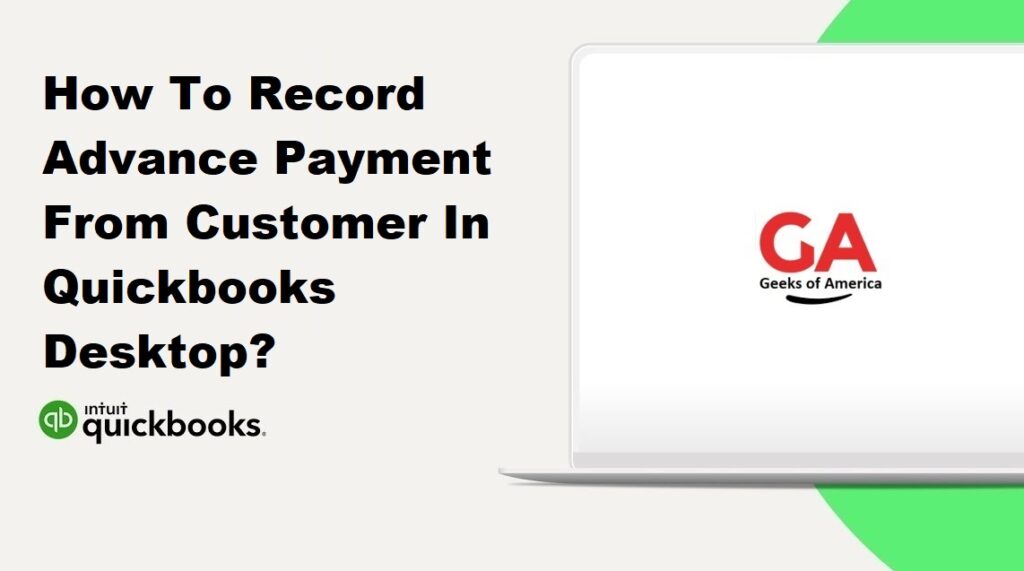
I. Introduction
Recording advance payments from customers in QuickBooks Desktop allows you to accurately track and manage customer deposits or prepayments. It ensures that your books reflect the cash flow and liabilities associated with these advance payments. In this guide, we will walk you through the step-by-step process of recording advance payments from customers in QuickBooks Desktop.
Read Also : How To Record Advance Payment From Customer In Quickbooks Online?
II. Understanding Advance Payments
Before we begin, let’s clarify what constitutes an advance payment:
- Definition:
- An advance payment refers to a payment made by a customer in advance of receiving goods or services. It is a prepayment that is typically made to secure an order or reserve a product or service.
- Treatment:
- Advance payments are recorded as liabilities on the company’s books until the goods or services are delivered. At that point, the liability is reduced, and the revenue is recognized.
Read Also : How To Categorize Continuing Education In Quickbooks?
III. Setting up Accounts
Before recording advance payments, you need to set up the appropriate accounts in QuickBooks Desktop to track these transactions. Follow these steps:
- Open QuickBooks Desktop and go to the “Lists” menu.
- Select “Chart of Accounts” to open the Chart of Accounts window.
- Click on the “Account” drop-down arrow and choose “New” to create a new account.
- Select the account type based on your business needs. For example, you can select “Other Current Liability” for advance payments received.
- Enter a name for the account, such as “Customer Advances” or “Customer Deposits.”
- Click on the “Save & Close” button to save the account.
Read Also : How To Set Up Shareholder Distribution In Quickbooks?
IV. Recording Advance Payments
Once you have set up the accounts, you can record advance payments from customers in QuickBooks Desktop. Follow these steps:
- Open QuickBooks Desktop and go to the “Customers” menu.
- Select “Receive Payments” to open the Receive Payments window.
- In the “Received From” field, select the customer from the drop-down list.
- Enter the payment date in the “Date” field.
- In the “Amount” field, enter the amount of the advance payment.
- In the “Deposit To” field, select the appropriate bank account where the payment will be deposited.
- In the “Memo” field, you can provide any additional notes or information related to the advance payment.
- In the “Method” field, select the payment method used by the customer.
- Click on the “Save & Close” button to save the transaction.
Read Also : How To Record Section 179 Depreciation In Quickbooks?
V. Applying the Advance Payment to an Invoice
When the goods or services are delivered and an invoice is issued, you can apply the advance payment to the invoice. Follow these steps:
- Open QuickBooks Desktop and go to the “Customers” menu.
- Select “Receive Payments” to open the Receive Payments window.
- In the “Received From” field, select the customer from the drop-down list.
- Enter the payment date in the “Date” field.
- In the “Amount” field, enter the amount of the advance payment.
- In the “Deposit To” field, select the appropriate bank account where the payment will be deposited.
- In the “Memo” field, you can provide any additional notes or information related to the advance payment.
- In the “Method” field, select the payment method used by the customer.
- In the “Outstanding Transactions” section, select the invoice for which you want to apply the advance payment.
- QuickBooks will automatically deduct the advance payment amount from the invoice total.
- If there is a remaining balance, enter the amount in the “Amount” field.
- Click on the “Save & Close” button to save the transaction.
Read Also : How To Create A Payment Receipt In Quickbooks Desktop?
VI. Reporting on Advance Payments
QuickBooks Desktop provides various reports that can help you track and analyze advance payments from customers. Here are a few commonly used reports:
- Open the “Reports” menu and go to “Customers & Receivables.”
- Select “Customer Balance Detail” to view a detailed report of customer balances, including advance payments.
- Customize the report by selecting the appropriate date range and customer information.
- Look for the advance payment transactions to see the details and balances.
Read Also : How To Make/Create Journal Entries In Quickbooks Desktop?
VII. Conclusion
Recording advance payments from customers in QuickBooks Desktop helps you accurately track and manage customer deposits or prepayments. By following the step-by-step instructions provided in this guide, you can set up the appropriate accounts, record advance payments, and apply them to invoices. Additionally, QuickBooks Desktop’s reporting capabilities allow you to track and analyze advance payments, providing valuable insights into your cash flow and customer balances. Properly recording advance payments in QuickBooks Desktop ensures that your books accurately reflect the financial transactions of your business.
